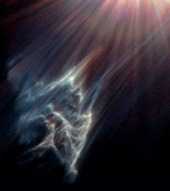Merope (Pleiades)
_-_Lost_Pleiad_(1884).jpg)
In Greek mythology, Merope (Greek: Μερόπη) is one of the seven Pleiades, daughters of Atlas and Pleione. Pleione, their mother, is the daughter of Oceanus and Tethys and is the protector of sailors.[1] Their transformation into the star cluster known as the Pleiades is the subject of varied myths.
Among the Pleiades
In one story, the Pleiades, along with their half sisters the Hyades, were the virgin companions to Artemis. Artemis was the twin of Apollo and daughter of Leto and Zeus, and a protector of both hunters and wild animals. The Pleiades were nymphs, and along with their half sisters, were called Atlantides, Modonodes, or Nysiades and were the caretakers of the infant Bacchus.[2]
Orion pursued the Pleiades named Maia, Electra, Taygete, Celaeno, Alcyone, Sterope, and Merope after he fell in love with their beauty and grace. Artemis asked Zeus to protect the Pleiades and in turn, Zeus turned them into stars. Artemis was angry because she no longer could see her companions and had her brother, Apollo, send a giant scorpion to chase and kill Orion. Zeus then turned Orion into a constellation to further pursue the Pleiades in the skies.[3]

In another legend, the sisters were transformed by Zeus into stars because Orion fell in love with them and relentlessly pursued their affection for 12 years. At first they were turned into doves, but later, along with Orion, into stars so that forever the hunter Orion would pursue them.[1]
In either legend the Pleiades were turned into stars and now, along with their half sisters, the Hyades (who died weeping for their dead brother Hyas), are part of the star constellation Taurus.
Marriage
Merope is the faintest of the stars because she was the only of the Pleiades to have married a mortal. Her sisters had relations with gods and bore them sons, but Merope married Sisyphus and lived on the island Chios. Merope gave birth to Glaukos, Ornytion, Almus, Thersander and Sinon. The star Merope is often called the “lost Pleiad” because she was at first not seen by astronomers or charted like her sisters. One myth[4] says that she hid her face in shame because she had an affair with a mortal man, another says she went to Hades with her husband, Sisyphus.[5]
In popular culture
J. K. Rowling, author of the Harry Potter novels, gave the name Merope Gaunt to the mother of her novels' primary villain, Lord Voldemort. Merope was a witch, while the father, Tom Riddle was a "muggle" (non-magical), categorizing Voldemort as a "half-blood". Merope in mythology, having married a mortal, would have placed her offspring in a similar situation.
Merope is also the absent mother of the young protagonist in "The Game" by Diana Wynne Jones.
References
- ↑ 1.0 1.1 The Pleiades in mythology, Pleiade.org
- ↑ Mythology of the Seven Sisters (Pleiads), National Astronomy and Ionosphere Center (Arecibo Observatory)
- ↑ Pleiades, in Greek mythology, InfoPlease
- ↑ Ovid, Fasti 4.169–178; Robert A. Kaster, Emotion, Restraint, and Community in Ancient Rome (Oxford University Press, 2005), p. 79.
- ↑ Merope: Definition, Answers.com
Bibliography
- Gibson, Steven. "Merope". Pleiades Mythology. Retrieved 22 April 2009.
- "Merope". Answers.com. 2009. Retrieved 22 April 2009.
- "Pleiades". The Columbia Electronic Encyclopedia. Infoplease. 2007. Retrieved 22 April 2009.
Further reading
- Calame, Claude. Myth and History in Ancient Greece. 1996. Trans. Daniel W. Berman. New Jersey: Princeton University, 2003.
- Ceci, Lynn. "Watchers of the Pleiades: Ethnoastronomy among Native Cultivators in Northeastern North America." Ethnohistory 25.4 (1978): 301-317. JSTOR. Lib. of University of Arizona. 2 Apr. 2009.
- Gould, John. “Law, Custom, and Myth: Aspects of the Social Position of Women in Classical Athens.” Myth, Ritual, Memory, and Exchange Essays in Greek Literature and Culture. New York: Oxford University, 2001. 112-157.
- Interpretations of Greek Mythology. 1987. Comp. Jan Bremmer. London: Routedge, 1990.
- Kellett, E. E. The Story of Myths. New York: Harcourt, Brace, and Company, 1927.
- Kershaw, Stephen P. The Greek Myths Gods, Monsters, Heroes, and the Origins of Storytelling. Brief Guide. New York: Carroll and Graf, 2007.
- Larson, Jennifer. Greek Nymphs: Myth, Cult, Lore. New York: Oxford University, 2001.
- Women’s Roles in Ancient Civilizations. Ed. Bella Vivante. Connecticut: Greenwood, 1999.
External links
- Condos, Theony; Hyginus (1997). Eratosthenes, ed. Star Myths of Greeks and Romans: A Sourcebook. Grand Rapids: Phanes Press. ISBN 978-1-890482-92-3. Retrieved 22 April 2009.